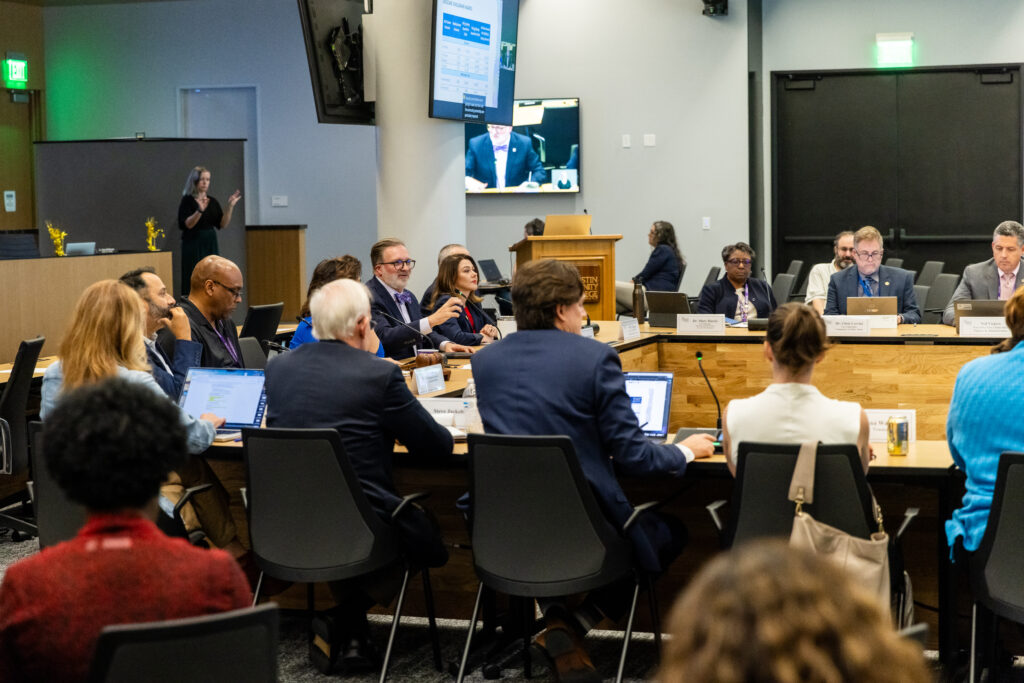Written by Gabriella Plasencia
For the next five years after July 1, 2024, ACC will be covering the cost of tuition for all incoming high school graduates. The project is a part of ACC Chancellor Lowery-Hart’s goal to reach a 70% completion rate, which came as a result of House Bill 8 changing the school’s funding model to be “outcomes-based” in the latest legislative session.
Though seemingly a step in a good direction, some students expressed that the project neglects ACC’s high number of adult learners. Members of the Student Government Association are asking for student participation in an ACC board meeting on May 6, which will determine whether an amendment should be added to benefit all ACC students in their last semester.
The initial proposal, referred to as the “First Dollar” pilot program, was first proposed by Chancellor Dr. Russell Lowery-Hart on January 8, and aims to alleviate the cost of education to incoming college students. Beyond just support, the program has also sparked constructive criticism from some students who say they are already struggling to stay in school or do not fit this traditional profile of a college student. ACC bestowing financial aid to fresh out of high school teenagers or anyone with a completed GED, called into question the equitable nature of the program when it comes to ageism and prioritizing one demographic over another in the student body.
On April 1, Rio Grande Campus Senator Carey Cranor advocated for the nontraditional students at another board meeting discussing prospects of the free tuition project. Because of the board’s heavy emphasis on helping recent high school graduates, Cranor took to the stand to represent the experience of adult learners coming back to school multiple years after a high school diploma.
Furthermore, he shared the obstacles that come with being an adult who wants to uplift themselves in the field of education and its opportunities. “I’m in full support of it, however the messages they touted were ‘culture of belonging’ and ‘equality’ and as it stands, the free tuition program does not support either of those visions,” Cranor said, “It does not support equality and borders on age discrimination. It does not support a culture of belonging because it tells adult learners that they will always come second.”
While being in full support of ACC’s attempts to alleviate the financial toll of college for its students, Cranor argued for a way to include everyone, suggesting an amendment that would cover the tuition of anyone in the last semester of their two year associates or four year bachelor’s degree plan at ACC.
In regards to amending the current project, Chancellor Lowery-Hart emphasized that the school’s goal is likely to “extend this to everyone” but asked that more data be presented to address Cranor’s suggestion in the May 6 board meeting. The initial program, which is written to be officially reevaluated in five years instead of the intended 10, is currently operating with a 7.6 million dollar budget – based on the estimated cost of the plan if it had been active last year. Continued funding for the program and its possible amendment will rely on positive results in these next five years, with increased graduation rates and student successes dictating whether or not it will become a permanent avenue for free tuition in the future.
“So if we start on the backend, the last semester, we’re rigging the numbers in our favor to continue this program,” Cranor said. As it stands now, higher education is generally more accommodating to a student with a blank slate coming from one educational institution to another as opposed to an adult who’s been working full time and living independently. “I hate to say this, but for a lot of our adult learners, it’s an even larger gamble for them to be in college than someone who is fresh out of high school because they’re coming from one school to another. Meanwhile for adult learners, they are one bad day, one bad grade from quitting and being done with it,” Cranor said.
Kristen Hummel, cofounder and president of The Scholarship Society composed a statement in support for the last semester tuition being covered for all students. In it, she details the age cut off on scholarship applications that adult learners face while searching for ways to pay for college. As it turned out for her, many of the scholarships she came across made 22 the max age, sometimes even 25, for applicants. “I sincerely don’t know if it is simply a matter of ignorance due to bad data, or unintentional focus on the inspiring potential of youth, but adult learners are set up to fail socially, financially, and–indirectly by the demands of life–academically,” Hummel wrote.
The notion of solely investing in the youth for a better future may come from underestimating the success of adults who are already active in their education as well as the extent of their presence in higher education. Hummel wrote, “We have the potential to enrich this school with new organizations, community contributions that result in awards, and sharing wisdom and leadership skills with younger generations. Please help students like… myself, and the determined members of The Scholarship Society stay here and accomplish great things. Please support this amendment for last-semester tuition for ACC graduates.”
To show support for the amendment and/or the initial pilot program, Cranor suggests emailing the Chancellor’s office or attending the May 6 board meeting – which is planned to be held at 3:00 PM in room 2110 of building 3000 in ACC’s Highland Campus.

